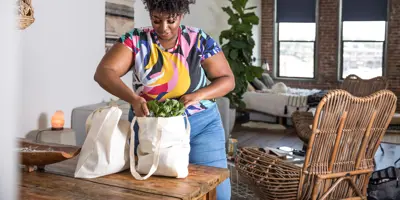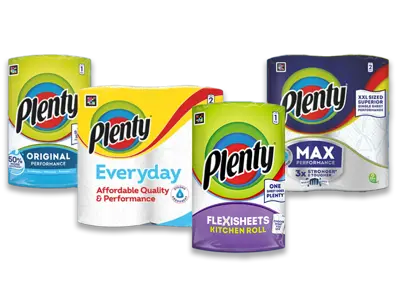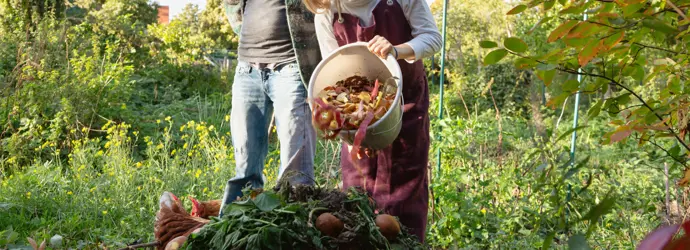
Whether we recycle, compost, or reduce the amount of packaging we buy, making sure you properly dispose of items can help cut down on waste.
But the options for how we can do this can sometimes feel a little overwhelming. Fear not! That’s why we’ve created this handy guide to help answer questions like ‘what is the difference between biodegradable and compostable?’ and ‘is compostable the same as biodegradable?’ Once you know the differences between compostable vs biodegradable, disposing of your waste sustainably will be that little bit easier!
Tip
Plenty Original kitchen roll sheets are now certified compostable,* which means you can stick it in the compost bin when you’re done wiping up those little (or big) messes! Make sure the mess is compostable, though, by checking out our guide.
Want to know more about Plenty’s compostable kitchen roll sheets? Check out the answers to your frequently asked questions.
Compostable vs biodegradable: what’s the difference?
There’s lots of different questions when it comes to disposing of waste properly – from knowing whether kitchen roll is flushable to understanding what happens to plastic after it’s recycled. But what is the difference between biodegradable and compostable? Let’s find out.
For something to be biodegradable, it must break down with the help of microorganisms into natural materials in the environment. Biodegradable products normally take around 3 – 6 months to break down, but, depending on the environment and material, it can take much longer.1
Composting, on the other hand, is the process of organic materials naturally decomposing in a composting environment, resulting in nutrient-rich matter that feeds the soil and helps plants, fruit and veg grow! Depending on the methods of composting, compostable items like vegetable scraps garden waste breakdown into compost from in-between six months and two years.2 But trust us, it’s worth the wait!
Before a product can be deemed compostable, it must be tested according to the standards for home composting and industrial composting, disintegrating and biodegrading in a composting environment within a certain time frame. In addition, the chemical composition of the product is also tested, to ensure that the product doesn’t negatively impact the compost’s quality.
Before a product can be deemed compostable, it must be tested according to the standards for home composting and industrial composting, disintegrating and biodegrading in a composting environment within a certain time frame. In addition, the chemical composition of the product is also tested, to ensure that the product doesn’t negatively impact the compost’s quality.
Does biodegradable mean compostable?
They sound similar – so, does biodegradable mean compostable? The answer is no - while all compostable items are biodegradable, not all that is biodegradable is compostable. In order for something to be compostable, it must be made of organic material, whereas something that is biodegradable is made from any material that can be broken down naturally.
But ‘is compostable the same as biodegradable?’ is a great question to ask, because knowing the difference can save your compost heap from things that shouldn’t be in there. This can slow down an already lengthy process, so why test your own patience?
For more handy, easy to break down information on composting (sorry!), check out our in-depth look at how composting works or discover a full list of things you can compost.
Degradable vs biodegradable
If something is degradable, it will break down or deteriorate so, given enough time, most things are degradable. But just because something can degrade, doesn’t mean it’s a good thing.
For example, ‘bad’ plastics will degrade, but over the course of thousands, if not hundreds of thousands of years. They become smaller and smaller until they are ground down into microplastics, which are harmful for a number of reasons, not least their potential to have adverse effects on species and ecosystems.3
Plenty’s sustainability initiatives
At Plenty we're continually working to improve the environmental footprint of our products. As you know, Plenty kitchen rolls are now certified compostable. So, no matter how many messes life throws at you, you can turn those messes into something positive! Why not check out some of our other sustainability initiatives?
After reading through this guide, you should now know the answer to ‘what is the difference between compostable and biodegradable?’. Want to learn more about sustainable living? Check out our guide on how to live more sustainably.
*Plenty kitchen towels are certified as home and industrially compostable according to NF T 50-800 and EN14995.
Sources:
1 Save Money Cut Carbon, How long does it take for plastic to biodegrade?
Related articles
Clean and green! 10 tips for eco-friendly cleaning
From baking soda and lemon cleaning methods to a surprising kitchen cupboard treatment for mould, read our sustainable cleaning products ideas for your home!
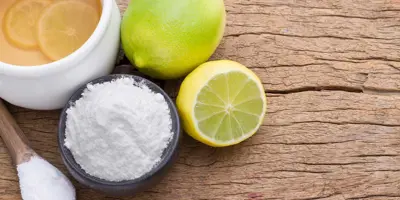
7 steps to create a DIY cardboard castle at home
Learn how to make a cardboard castle to fit their favourite interests. Find step-by-step cardboard castle DIY instructions and theme ideas here.
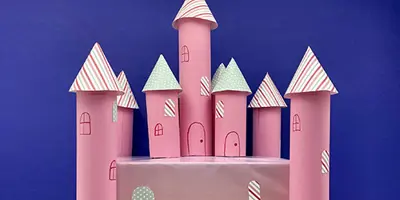
Reducing waste at home: The easy way
Find out how to save energy at home and reduce food waste with our top tips. Read on for handy pointers for making your household more eco-friendly.
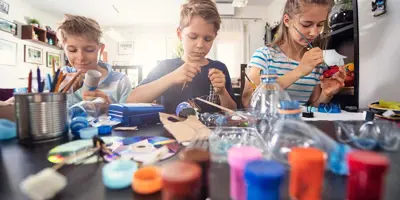
6 tips on how to save water at home
Learn how to save water at home. Find five easy ways to conserve water, so you can bring down your waste and make some clever savings in the process, here.

What does biodegradable mean and what is non-biodegradable?
Biodegradable and non-biodegradable? What do they mean?! Don’t fret, discover the definitions and biodegradable materials to become an eco-friendly pro!
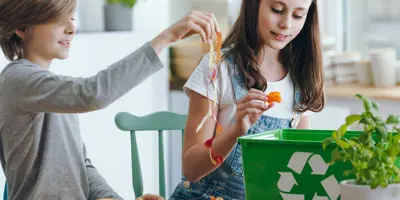
How to lead a sustainable lifestyle in 5 key ways
Learn how to live more sustainably with our tips on diet, methods of transport, energy consumption and product choices. Find sustainable living examples here.
